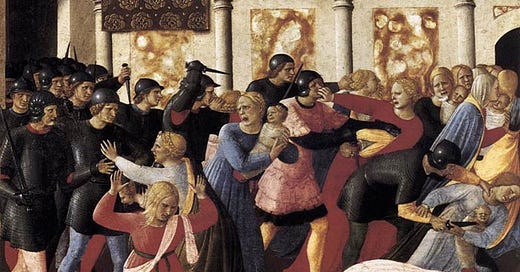Advent with Auden: (Part IV: Rachel's Lament, "Somewhere in these unending wastes of delirium is a lost child...")
Fourth Post on W.H. Auden's "For the Time Being: A Christmas Oratorio"
There are not very many Christmas carols about the massacre of the innocents, the name given to the slaughter of all the babies in Bethlehem ordered by King Herod (excepting the Coventry Carol, one of the most haunting tunes of all time). It is the part of the Christmas story that we want to avert our eyes from. We like the stable, the donkeys, the angels, the shepherds, the magi; we don’t want to see what happens in the wake of Jesus’ entry into the world, the way that the powers and principalities are already trying to take Jesus out.
Matthew tells the story in sparse, biblical style:
Then Herod, when he saw that he was deceived by the wise men, was exceedingly angry; and he sent forth and put to death all the male children who were in Bethlehem and in all its districts, from two years old and under, according to the time which he had determined from the wise men. Then was fulfilled what was spoken by Jeremiah the prophet, saying:
“A voice was heard in Ramah,
Lamentation, weeping, and great mourning,
Rachel weeping for her children,
Refusing to be comforted,
Because they are no more.”Matthew 2:16-18 (NKJV)
In “For the Time Being,” W.H. Auden expands the lament of Rachel, and it’s a breathtaking piece of poetry. It comes after two long sections of mostly prose, Simeon and Herod both rationalizing and philosophizing their postures of faith (Simeon) or tyranny (Herod). But Rachel’s lament breaks through their lengthy and somewhat dry prose, and cuts them down: how dare you philosophize when children are being slaughtered? Here is her cry in the poem:
RACHEL
On the Left are grinning dogs, peering down into a solitude
too deep to fill with roses.On the Right are sensible sheep, gazing up at a pride where
no dream can grow.Somewhere in these unending wastes of delirium is a lost child,
speaking of Long Ago in the language of wounds.To-morrow, perhaps, he will come to himself in Heaven.
But here Grief turns her silence, neither in this direction, norin that, nor for any reason. And her coldness now is on the earth forever.
What Auden reminds us is that Jesus did not come to a picturesque, Thomas-Kincaid-cottage kind of world—he came to a world of blood and horror, pain and betrayal. Senseless slaughter. A world where men can talk themselves into massacring children, a world where a lust for power overcomes the sanctity of life.
In reading this part of the poem, I couldn’t help but think it’s the world we still reside in. I couldn’t help but think of the children of Israel and Gaza, the holy innocents, full of potential and joy and beauty, whose lives are being snuffed out as we speak, over two thousand years after the first Christmas. How we men are still talking, rationalizing, writing, opining, while so many are dying, while so many are killing.
The story from the fightings that has haunted me is one told by the journalist Douglass Murray, of a father whose son was killed in the October 7th attacks. Murray records the father’s testimony in the Free Press:
“He told me his October 7 story. His wife and two children were hiding in a safe room in their house when Hamas set fire to the home. As smoke rose, terrorists found a window in the safe room and threw grenades through it. Then a Kalashnikov rifle appeared. His wife was killed by a grenade; two bullets pierced the chest of his 14-year-old son, a young surfer.
As his son bled out, he asked his father, “Will you bury me with my surfboard?”
Days later, when authorities found the man in the hospital and asked if he wanted anything from his home, he gave a simple reply: “I want nothing from my house but my son’s surfboard.”
His son was buried with his surfboard.”
Rachel mourns for her children, because they are no more.
I also think about two Christians who were killed in Gaza, a mother and daughter, who had taken refuge in the Holy Family Parish in Gaza, as reported by the Latin Patriarchate of Jerusalem. One was shot by a sniper of the IDF, and the other was killed as she tried to carry her loved one to safety; both perished, shot in cold blood in a holy place where there were no belligerents.
I am probably very much like you as I read all of this news, as I take it in: I believe in the right for self-defense, I am horrified by the violence, and I shudder to think about how many more must die. But it is the children, always the children, that one cannot forget, that one cannot rationalize away, that one cannot really in the end make any defense for.
God’s solution to the horror of war, to the horror of the human condition, was to become a holy innocent himself—the Christ child from day one is hunted by the powers that be, and they will not stop until he is strung up on a cross, taking on his body every horror and pain that humanity has every imagined.
May we, this Christmas, join our lament to Rachel’s. Let us not avert our eyes from the horror of war, but let us bear witness to it and then pray for the Holy Innocent, the Christ, to come again to this world. May his peace reign, may his kingdom come, may his will be done.




